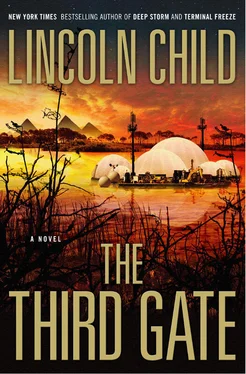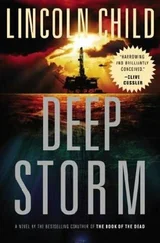Lincoln Child - The Third Gate
Здесь есть возможность читать онлайн «Lincoln Child - The Third Gate» весь текст электронной книги совершенно бесплатно (целиком полную версию без сокращений). В некоторых случаях можно слушать аудио, скачать через торрент в формате fb2 и присутствует краткое содержание. Жанр: Триллер, на английском языке. Описание произведения, (предисловие) а так же отзывы посетителей доступны на портале библиотеки ЛибКат.
- Название:The Third Gate
- Автор:
- Жанр:
- Год:неизвестен
- ISBN:нет данных
- Рейтинг книги:3 / 5. Голосов: 1
-
Избранное:Добавить в избранное
- Отзывы:
-
Ваша оценка:
- 60
- 1
- 2
- 3
- 4
- 5
The Third Gate: краткое содержание, описание и аннотация
Предлагаем к чтению аннотацию, описание, краткое содержание или предисловие (зависит от того, что написал сам автор книги «The Third Gate»). Если вы не нашли необходимую информацию о книге — напишите в комментариях, мы постараемся отыскать её.
The Third Gate — читать онлайн бесплатно полную книгу (весь текст) целиком
Ниже представлен текст книги, разбитый по страницам. Система сохранения места последней прочитанной страницы, позволяет с удобством читать онлайн бесплатно книгу «The Third Gate», без необходимости каждый раз заново искать на чём Вы остановились. Поставьте закладку, и сможете в любой момент перейти на страницу, на которой закончили чтение.
Интервал:
Закладка:
Logan thought a moment. “It rings a distant bell.”
“People assume that the Nile is just a wide river, snaking its way unimpeded out from the heart of Africa. Nothing could be further from the truth. The early British explorers-Burton and Livingstone and the others-found that out the hard way when they encountered the Sudd. But take a look at that-it’ll describe the place far more eloquently than I can.” And Rush gestured to a book on a nearby table.
Logan hadn’t noticed it before and now he picked it up. It was a battered copy of Alan Moorehead’s The White Nile. It was a history of the exploration of the river; he vaguely remembered leafing through a copy as a child.
“Page ninety-five,” Rush said.
Logan flipped through the book, found the page, and-as the saloon throbbed around him-began to read.
The Nile… is a complicated stream. [It] proceeds through the desert on a broad and fairly regular course… [But ultimately] the river turns west, the air grows more humid, the banks more green, and this is the first warning of the great obstacle of the Sudd that lies ahead. There is no more formidable swamp in the world than the Sudd. The Nile loses itself in a vast sea of papyrus ferns and rotting vegetation, and in that foetid heat there is a spawning tropical life that can hardly have altered very much since the beginning of the world; it is as primitive and hostile to man as the Sargasso Sea… [The] region is neither land nor water. Year by year the current keeps bringing down more floating vegetation, and packs it into solid chunks perhaps twenty feet thick and strong enough for an elephant to walk on. But then this debris breaks away in islands and forms again in another place, and this is repeated in a thousand indistinguishable patterns and goes on forever… Here there was not even a present, let alone a past; except on occasional islands of hard ground no men ever had lived or ever could live in this desolation of drifting reeds and ooze, even the most savage of men. The lower forms of life flourished here in mad abundance, but for… men the Sudd contained nothing but the threat of starvation, disease and death.
Logan put the book down. “My God. Such a place really exists?”
“It exists all right. You’ll see it before dark.” Rush shifted on the banquette. “Imagine: a region thousands of square miles across, not so much swamp as a labyrinth of papyrus reeds and waterlogged trunks. And mud. Mud everywhere, mud more treacherous than quicksand. The Sudd isn’t deep, often just thirty or forty feet in places, but in addition to being horribly honeycombed with braided undergrowth, its water is so full of silt, divers can’t see an inch beyond their faces. The water’s full of crocodiles by day, the air full of mosquitoes by night. All the early explorers gave up trying to cross it and eventually went around. The Sudd may not be quite as remote or impassable today as it was in the times Moorehead wrote of, but it’s no picnic. It’s in a wide, shallow valley. And every year it spreads. Just a little, but it spreads. It’s like a living thing-that’s why we need such a narrow craft. Trying to traverse the Sudd is like threading a needle through the bark of a tree. Every day we have a recon helicopter that charts the shifting eddies, maps new paths through it. And every day, those routes change.”
“So the vessel acts sort of like an icebreaker,” Logan said. He was thinking of the strange equipment he’d seen at the bow.
Rush nodded. “The shallow draft helps clear underwater obstructions, and the propeller at the stern provides the raw power necessary to push through tight spots.”
“You’re right,” Logan said. “It does sound like hell on earth. But why are we…” He stopped. “Oh, no.”
Rush nodded. “Oh, yes.”
“Good lord.” Logan fell silent a moment. “So Narmer’s tomb is there. But why?”
“Remember what Stone said? Think about it. Narmer went to unprecedented lengths to conceal the location of his tomb. He actually went out of Egypt proper, past the six cataracts of the Nile, into Nubia-a dangerous journey into hostile lands. Given how early in Egyptian history this was-remember, this is the Archaic Period, the First Dynasty-it’s an accomplishment on the order of the Great Pyramid. Not only that, but Narmer is the only pharaoh not buried in Egypt-as you probably know, all pharaohs had to be entombed on Egyptian soil.”
Logan nodded. “That’s why Egypt never colonized.”
“Given all this, Jeremy-all this incredible effort and expense and risk-do you really think it likely that Narmer’s tomb contains little of value?”
“But an impenetrable swamp…” Logan shook his head. “Think of the logistics involved in tomb building-especially for a primitive culture, operating in a hostile region.”
“That’s the fiendish beauty of the thing. Remember how I said the Sudd spreads a little every year? Narmer knew that. He could build his tomb on what was then the edge of the Sudd, keeping its location secret. There’s a vast system of volcanic caves just below the surface of the Sudd valley. After his death, the swamp, expanding ever outward, would hide all traces of his tomb. Nature would do the job for him.” Rush’s face took on a troubled look. “Almost too well.”
“What do you mean?”
“You heard Stone. The site is up and running, smooth as clockwork. All the experts are in place, the technicians and archaeologists and mechanics and the rest. Only…” He hesitated. “Only the precise location proved a little more difficult to find than Stone’s experts assumed.” Rush sighed. “Of course there is the usual need for a low profile-not as much as on a typical site, of course, but it’s there nonetheless. And it’s the worst time of the year to work, too: the rainy season. It makes the Sudd that much more difficult and unpleasant and unhealthy a place to work.”
Logan remembered Stone’s words: We are under some significant time pressures. “So why the frantic pace? Why not just wait for the dry season? The tomb has sat there for five thousand years-why not another six months?”
As if in answer, Rush stood and beckoned Logan to follow him out of the saloon. They regained the deck and walked carefully forward to the bow. The sun was sinking toward the horizon, the pitiless white ball now an angry orange. The Nile spread out from the prow in thick undulating lines. The cry of waterbirds was giving way to strange trumpetings from either bank.
Rush spread his hands. Glancing ahead, Logan saw a range of hills rising on both sides of the river, widening to form a vast amphitheater ahead of them, marching on into the distance where sight failed. “You see that?” Rush asked. “Beyond those is the Af’ayalah Dam. Already it’s nearing completion on this, the Sudanese side of the frontier. In five months, all this-everything, the whole useless godforsaken place-will be underwater.”
Logan peered into the gathering gloom. Now he understood the hurry.
As he peered thoughtfully into the water ahead, he began to notice bracken floating in the lazy current. First, just bundles of papyrus reeds. But then the reeds began forming small islands, attaching themselves to promontories of mud that rose out of the river like miniature volcanoes.
“The dam provides us with a great cover story,” Rush went on. “We’re posing as a team researching the ecosystem, documenting it before it’s gone forever. But that layer of phoniness costs extra money, and, again, the longer it continues, the more difficult the deception becomes.”
The boat began to slow as the debris grew thicker. Now Logan could see huge logs, twisted together as if in titanic struggle, moss and rotting weeds hanging from their flanks like so much webbing. A stench of decay and overripe verdure began rising around them. A door in the superstructure opened and two mates appeared, each carrying a strange, harpoonlike weapon attached to pneumatic hoses. They took up positions in the platforms on each side of the bow, leaning out over the water, devices at the ready.
Читать дальшеИнтервал:
Закладка:
Похожие книги на «The Third Gate»
Представляем Вашему вниманию похожие книги на «The Third Gate» списком для выбора. Мы отобрали схожую по названию и смыслу литературу в надежде предоставить читателям больше вариантов отыскать новые, интересные, ещё непрочитанные произведения.
Обсуждение, отзывы о книге «The Third Gate» и просто собственные мнения читателей. Оставьте ваши комментарии, напишите, что Вы думаете о произведении, его смысле или главных героях. Укажите что конкретно понравилось, а что нет, и почему Вы так считаете.












